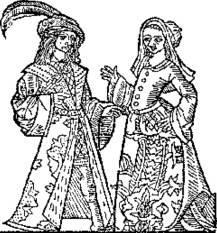Interludes
In the Great Hall* of a nobleman's house, guests have almost finished the banquet when two "servants" start to speak*. One announces that a play is about to begin; it is about a Roman maid, Lucrece, who is wooed by two suitors.
Lucrece is the daughter of Fulgens, a Senator of noble birth; one of her suitors, Cornelius, is of noble birth, but rather vain; the other is Flaminius, of lower birth but greater merit. The play explores the issues between noble birth and merit, and at the same time, in Fulgens, portrays a father genuinely concerned to see his daughter happy.
In a structure that was to be used again and again later in the period, the servants echo the action of the main plot, as both of them woo Lucrece's maid.
Fulgens and Lucrece* is an interlude, a short play with no need of a stage, and is unified like the morality plays on a central subject of debate.
Footnotes
-
All the world's a stage
One such Great Hall was that at Knole House where Thomas Sackville, co-author of the tragedy Gorboduc lived. Click to see the hall as it is today.
-
A scene from an interlude
The two servants are called simply "A" and "B" in the manuscript. Here B denies that he is an actor ( a player)--and seems to be insulted.
A: But I pray you, tell me that again,
Shall here be a play?
B: Yea for certain.
A: By my troth thereof am I glad and fain [happy],
An [if] you will me believe;
Of all the world I love such sport . . .
I trow your own self be one
Of them that shall play.
B: Nay, I am none;
I trow thou speakest in derision
To liken me thereto.
A: Nay, I mock not, wot [know] ye well,
For I thought verily by your apparel
That ye had been a player.
B: Nay, never a dell [bit].
A: Then I cry you mercy [ask your pardon]. -
Fulgens and Lucrece
The play was written by Henry Medwall in the 1490s. Medwall was a contemporary of Sir Thomas More, and was chaplain to a Cardinal Morton, an early humanist.
